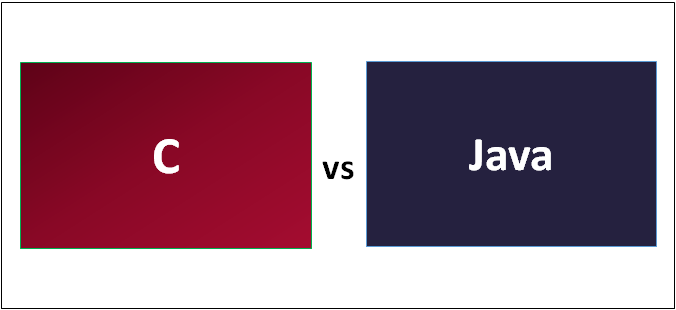Difference Between C vs Java
C: Almost all of us know who Dennis M. Ritchie is. Yes, he developed C between 1969 and 1973 at Bell Labs, and it was used to re-implement the UNIX operating systems. Do you know the project name where C was developed? It’s Multics.
Java: James Gosling is the developer of Java. It was developed at Sun Microsystems and released in 1995 as a component of Sun Microsystems. Initially, it was called Oak after an Oak tree outside Gosling’s office. Then it was changed to Green, and finally, it was renamed Java.
Head-to-Head Comparison Between C vs Java (Infographics)
Below are the top 13 comparisons between C vs Java:
Key Differences Between C vs Java
The key difference between C vs Java is explained in the below-mentioned points:
- C and Java’s main key difference is the programming paradigm that tells us that C is procedure-oriented and Java is data-oriented.
- C does not support the OOPs concept, whereas its counterpart supports OOPs. Thus Java is suited when one has to relate things according to the real world.
- Memory management is also essential because Java does not allow access to any memory it internally manages. Thus it is easy to focus on developing the business logic.
- Exception handling is one powerful mechanism in Java that maintains the normal flow of the program in case of any abnormalities that we cannot achieve directly in C.
- Portability is also a factor when we compare languages. When income to Java, it wins the race in terms of portability.
- C also does not support the concept of threading which is also a significant advantage in Java. In today’s day-to-day environment, threading is a big plus point that allows us to do our work simultaneously and save time.
C vs Java Comparison Table
Below is a list of points that describe the comparison between C vs Java:
| Basis of Comparison | C | Java |
| Language Type | Procedural Programming Language.
|
Object-Oriented Programming Language.
|
| Programming Paradigms (pattern/models) |
|
|
| Approach |
|
|
| Preprocessors |
|
|
| Memory Management |
|
|
| Portability |
|
|
| Object Management |
|
|
| Thread |
|
|
| Memory Allocation |
|
|
| Exception Handling |
|
|
| Overloading |
|
|
| Calling Functionality |
|
|
| Variable Declaration |
|
|
Conclusion
So from the above discussion, we concluded that C vs Java is two different programming languages. Java is the most popular language at the industry level for the development of web applications as well as mobile applications. But we can’t deny that C, the oldest language, is also very popular. Everything from a microcontroller to operating systems is written in C due to its flexibility and versatility, allowing maximum control with minimum commands. Both C vs Java programming languages hold their position in different aspects, so there are always points where we can compare but cannot replace each other.
Recommended Articles
This has been a guide to C vs Java. Here we have discussed C vs Java head-to-head comparison, key differences, infographics, and comparison table. You may also have a look at the following articles to learn more –




